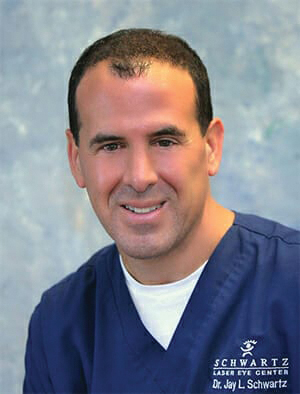Who is the official team Ophthalmologist for the Arizona Diamondbacks, the Phoenix Suns, and the Phoenix Mercury as well as the team LASIK Surgeon for the Arizona Coyotes? It is none other than Dr. Jay L. Schwartz, the highly regarded Board-Certified LASIK Surgeon and President, Schwartz Laser Eye Center.
As the leader in LASIK procedures, Dr. Schwartz provides his expertise from his three Valley centers in Mesa, Scottsdale and Glendale. Dr. Schwartz also trains other surgeons nationally and around the world.
From these locations, including one right here in Mesa at 3130 E. Baseline Road, the Schwartz Laser Eye Center’s highly trusted team of ophthalmologists and optometrists offer advanced treatments and surgical options for their patients. Services include customized LASIK, Epi-LASIK, multiple cataract lens options, and treatment for many eye diseases, including glaucoma and dry eyes.
In addition, comprehensive routine eye examinations for contact lenses, glasses, or just general eye health are performed at all three facilities.
I had the opportunity to ask Dr. Schwartz about age-related eye conditions, care, as well as candidacy for various
procedures and here’s what he had to say.
AT WHAT AGE SHOULD SOMEONE BEGIN RECEIVING ROUTINE EYE EXAMS?
Routine eye exams should begin with children, ages 8 to18. These are the years thought of as primary care for the eyes. During this time parents should schedule regular eye exams, encourage healthy eating, and help children protect their eyes against sun damage.
Early treatment of eye problems can help prevent long term issues later in life. This is especially true when it comes to the need for glasses and contact lenses.
AT WHAT AGE DOES SOMEONE BEGIN TO EXPERIENCE ISSUES WITH VISION?

People can experience vision issues at any age, however from ages 18 to 40 we often see a stabilization of glasses and contact lens prescriptions. From ages 40 to 65, we start to see diseases that can affect the eyes.
Systemic diseases can and often do have eye manifestations, so it’s never too early to look for those things in
routine examinations.
Presbyopia issues generally begin to appear in young adults after age 40. This causes a need for reading glasses in someone who otherwise has very good vision.
Diseases such as diabetes, glaucoma, hypertension, and cataracts — just to name a few — all can start to affect the eye after 40. The issues can get worse with age so annual checkups at this time is a must
WHAT IS PRESBYOPIA?
Presbyopia is caused by a hardening of the lens of the eye which naturally occurs with aging. As the lens of the eye becomes less flexible, it is no longer able to change shape to focus on close-up images. This generally happens around the age of 40 and continues to worsen until around the age of 65.
WHAT ARE THE BENEFITS OF LASIK PROCEDURES?
LASIK corrects nearsightedness, farsightedness, and astigmatism, which are refractive errors caused by irregularly shaped or curved corneas.
The goal of LASIK is to reshape the cornea, so it alters the way light enters the eye and vision becomes sharper and more focused.
WHO IS A GOOD CANDIDATE FOR LASIK?
Lasik can be done at almost any age, ranging from 18 to 100, however it’s not always the right option for everyone. Someone in the same age group may need a different procedure like an ICL — a contact lens that can be implanted into the eye to correct very high levels of nearsightedness and astigmatism.
Similarly, patients aged 46 to 65 may be great LASIK candidates or alternatively might be better off with a clear lens exchange. Removing the natural lens in favor of an artificial lens can help restore near and intermediate vision along with distance vision as opposed to a LASIK procedure that may only restore distance or a more compromised monovision type of correction (one eye sees far while the other sees near).
Having a comprehensive exam as well as a thorough discussion will help determine what is the best way to proceed.
WHEN DO CATARACTS GENERALLY BEGIN TO APPEAR?
Patients 65 and up often have cataracts. These patients may be able to have the same technology we use for clear lens exchanges to allow for near, intermediate, and far vision. Often, insurance helps to cover some of the cost.
Whether you’re inspired to see the world more clearly without glasses or contact lenses, or simply requesting a routine annual eye exam for a child, the Schwartz Laser Eye Center, locally located at 3130 E. Baseline Road, Suite 101, hosts a professional team of doctors willing to address your needs. Visit them online at schwartzlaser.com, or call (480) 483-3937, and prepare to be treated like a Superstar!


